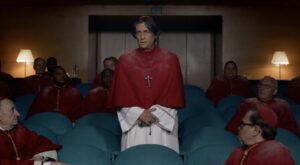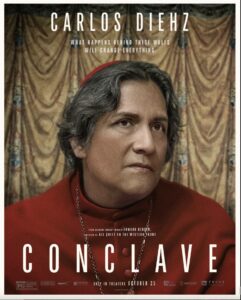Andrew L. Urban
Warning: spoiler alert! The Pope is dead. No, seriously. In a stark confluence of life and art, the conclave that has just started at the Vatican has had a cinematic rehearsal with the film, Conclave. If you haven’t seen it as yet, you may not be too keen to do so, given it’s been in cinemas for weeks and is now in restricted scheduling in a select few venues.
The film won the Oscar for its adapted screenplay by Peter Straughan, working from the 2016 book by one of my favourite authors (of historical novels, eg his Cicero books and Pompeii) Robert Harris.
Here’s another spoiler alert: the new Pope is a man … er… a person, with complex gender issues. This is revealed near the end of the film when he is elected, much to the surprise of the audience, not to mention his fellow cardinals.
Much of the public response to the film is exemplified by someone calling themselves Light52:
I just got back from the theater after seeing “Conclave,” a film I was extremely excited for and liked a lot. For most of the movie I was so captivated by the gorgeous cinematography, fantastic performances, great score, and quality costume and production design, that I was convinced this must be a 10/10 movie. But then, unfortunately, the ending arrived.
I believe that the ending to a film is the most important part. What will you leave the audience with? What is your final statement to them? Well, in this movie, it’s so contrived, confusing, and absurd that any final statement becomes muddled, and I left the theater with a bad taste in my mouth. The ending is so unrealistic that it threatens to destroy every frame of what came before. It is done purely to make a statement about the church and to shock the audience. Now, this doesn’t ruin the movie as a whole (not to me, anyway), but it does unfortunately mar an otherwise superb film.
For another, Blimplarg, “the ending felt added on, and didn’t properly integrate with the rest of the film. Whilst the message was well intentioned, to an extent, it undermined the build up in the rest of the film – it felt simplistic and a la mode – unnecessarily.”
Of the professional critics, The Guardian’s veteran film critic Peter Bradshaw has perhaps the best one liner: “a high camp gripper, like the world’s most serious Carry On film.”
At Vanity Fair, Richard Lawson echoes the general sense of unease with the choice of new Pope “Conclave’s final surprise courts controversy in reckless fashion, threatening to ruin the good time. It doesn’t quite, though. We can forgive a last-minute error in judgment because otherwise, Conclave is a literate treat, a movie that stirs the mind just enough to feel substantial.”

Carlos Diehz as Benitez
Australians also took it all literally. “The new Pope is intersex – and is duly named Innocentius to signify a pureness of heart,” writes the excellent Janet Albrechtsen in The Australian, in a scathing attack on Hollywood, she claims “Conclave makes no effort to engage with conservative thinking. Hollywood is today so immersed in liberal shibboleths that it is unable to characterise those views it disagrees with in a nuanced or sophisticated way,” which may well be true of Hollywood but perhaps misses that sophisticated satire exhibited by Harris.
In the Sydney Morning Herald, Jake Wilson didn’t buy “the final twist … which, in fairness, is far-fetched enough that it may be meant to make us view the film in hindsight as a fable.”
I haven’t gone through all 286 critic reviews published on IMDB, but these few amateur and professional examples of responses to the film suggest that a different interpretation of the choice has not been considered. Has Conclave conned us all? We didn’t get it?
Being a fan of Robert Harris’ superb writing prowess may be driving my take that in fact the choice of a gender-challenged Cardinal with almost saintly personality is Harris in high satire mode? Hidden under the purple robes of the Papal candidates we glimpse many sins…that, too, can all be seen as satire. The election of an intersex Cardinal as Pope is the give-away.

This interpretation changes the way we look at the film and enjoy it even more fully. As heavenly satire.
